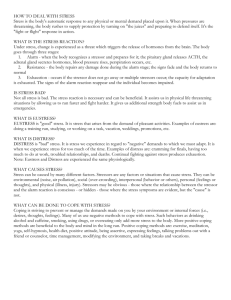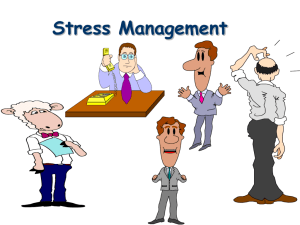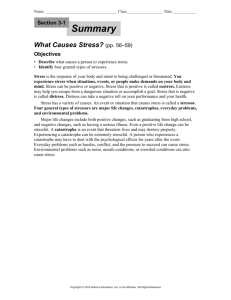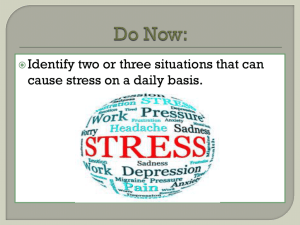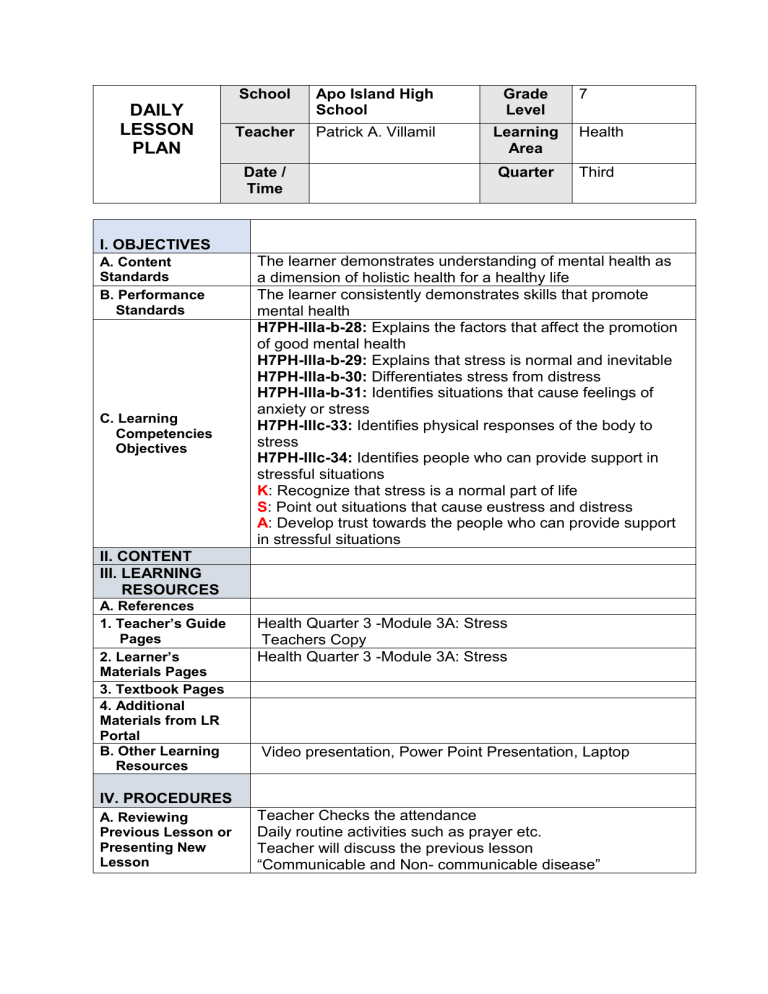
DAILY LESSON PLAN School Apo Island High School Grade Level Teacher Patrick A. Villamil Learning Area Date / Time Quarter 7 Health Third I. OBJECTIVES A. Content Standards B. Performance Standards C. Learning Competencies Objectives The learner demonstrates understanding of mental health as a dimension of holistic health for a healthy life The learner consistently demonstrates skills that promote mental health H7PH-llla-b-28: Explains the factors that affect the promotion of good mental health H7PH-llla-b-29: Explains that stress is normal and inevitable H7PH-llla-b-30: Differentiates stress from distress H7PH-llla-b-31: Identifies situations that cause feelings of anxiety or stress H7PH-lllc-33: Identifies physical responses of the body to stress H7PH-lllc-34: Identifies people who can provide support in stressful situations K: Recognize that stress is a normal part of life S: Point out situations that cause eustress and distress A: Develop trust towards the people who can provide support in stressful situations II. CONTENT III. LEARNING RESOURCES A. References 1. Teacher’s Guide Pages 2. Learner’s Materials Pages 3. Textbook Pages 4. Additional Materials from LR Portal B. Other Learning Resources Health Quarter 3 -Module 3A: Stress Teachers Copy Health Quarter 3 -Module 3A: Stress Video presentation, Power Point Presentation, Laptop IV. PROCEDURES A. Reviewing Previous Lesson or Presenting New Lesson Teacher Checks the attendance Daily routine activities such as prayer etc. Teacher will discuss the previous lesson “Communicable and Non- communicable disease” B. Establishing a Purpose for the Lesson C. Presenting Examples/Instances of the New Lesson The teacher will present a video. The teacher will ask the student about their understanding from the video presented. When was the last time you got………..? Angry Tired Exhausted Over Fatigue Sad (Students will answer) The teacher will discuss “STRESS”: Stress is defined as the physiological or physical and emotional responses to a significant or unexpected change or disruption in one’s life. It may also refer to “what you feel when you react to pressure, either from the outside world (school, family, friends) or from yourself i.e., wanting to fit in, wanting to do well in school. These are called stressors. What is stressor? Stressors refers to the things that make a person stressed. (The teacher will give an example of stressor) The teacher will the ask the students: Do you think that stress is always something negative? (Students will answer) D. Discussing New Concepts and Practicing New Skills #1 The teacher will discuss about the two different kinds of stress: eustress and distress. Eustress refers to a positive and healthy response of the body from a stressor. The prefix eu of eustress is a Greek syllable which means positive. For example, a person, who studied for long hours then took and got an outstanding grade in the exam, may feel happiness and enjoyment. On the other hand, distress refers to a negative reaction of the body towards a given stressor. The prefix di of distress is a Greek syllable which means negative. Distress may cause problems in health, alter the mood and emotions, and even affect the way a person thinks. For example, when a person woke up late for work, he or she may feel anger and disappointment. It is very important that we should know the people whom we can seek help when we are in a stressful situation. The following are some who can provide support: Family Friends Guidance Counselors Teachers Barangay Health Workers The teacher will give a short activity to the students. E. Discussing New Concepts and Practicing New Skills #2 Boyong who is now in Grade 7 is a consistent honor student. One day in school, his Math teacher called his attention about his recent score in their summative test. His teacher told him that he got a lower score than his previous exams. He was sad about it and worried on his grade. The reason why it happened because he spent longer time playing an online game called Mobile Legends or ML than his studies. So, to make his scores higher again he stopped playing ML and studied longer than he did before. As a result, he got an outstanding grade and ranked “With High Honors” and felt so much joy and happiness. (The teacher will ask the students to point out that cause eustress and distress from the given scenario) “Drama” F. Developing Mastery The class will be divided into two groups. Each group will create a dramatization that contribute to their stress/distress and how they able to solve it with the help of their family, friends, teacher etc,. Students will be given 5 minutes to practice. The following criteria will be use: Originality of presentation - 30% Interpretation - 30% Positive values/message - 40% G. Finding Practical Applications of Concepts and Skills in Daily Living H. Making Generalizations and Abstractions about the Lesson 100% A Story of Stress (Video presentation) Questions to ponder: Does stress is a normal part of life? “Oral Recitation” Students will need to answer the question “What I Have Learned” Assessment: Identify the different concepts about stress. Look for your answers from the word pool. Write the letter of the correct answer in your paper. I. Evaluating Learning A. Distress B. Eustress D. Stress C. Positive E. Stressor 1. It is defined as the physical and emotional responses to a significant or unexpected change or disruption in one’s life. 2. It refers to the things that make a person stressed. 3. It refers to a positive and healthy response of the body from a stressor. 4. It refers to a negative reaction of the body towards a given stressor. 5. What do you mean by the syllable EU in the word Eustress? J. Additional Activities for Application or Remediation V. REMARKS VI. REFLECTION A. No. of learners who earned 80% on the formative assessment B. No. of learners who require additional activities for remediation C. Did the remedial lessons work? No. of learners who have caught up with the lesson. D. No. of learners who continue to require remediation E. Which of my teaching strategies worked well? Why did these work? F. What difficulties did I encounter which my principal or supervisor can help me solve? G. What innovation or localized materials did I use /discover which I wish to share with other teachers? Submitted by: Patrick A. Villamil Teacher I Checked by: Mervina Lou. Arranquez School Head

